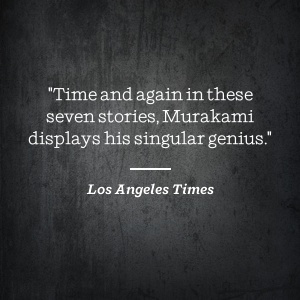

Full description not available



R**R
I welcome the introspection
As a man, without a woman, this title intrigued me. But what lead me to Haruki Murakami was a woman I briefly chatted with from a dating site as we exchanged books of authors we were currently reading. So this is my very first Haruki Murakami book I’ve read and I have to say, it’s fitting, for me. I enjoyed this book, very much. I identified with some aspects of these men (I’m sure most men do) from each story. I would have loved to narrate this book. Thank you Haruki Murakami. You have a new fan. More importantly, thank you to the woman who introduced me to you.Regards,L
M**N
Less is more- another reason why Murakami is the best
On a scale of awkward to surreal, this compilation of Murakami short stories leans more towards the awkward end. In true Murakami style, you'll be exposed to subtle themes on dichotomy - the dueling contrasts within oneself, the contrasts between a man and a woman, and the contrasts between our personal microcosm and the external macrocosm. I like how Murakami balances these stories by interchanging characters throughout. For instance, he starts the book with a story of a man who befriends his late wife's lover, and ends the book with a story of a man who learns of the death of his ex-lover through her husband. Perhaps all the characters in these stories are all the same, and are stuck in an alternate reality/parallel universe, also known as the Murakami purgatory. Maybe Murakami is holding a mirror to our own reality showing us how sometimes we experience the requited and sometimes the unrequited. Or that none of us have "love antibodies" and that we'll eventually play the part of the weird, secretive and lonely protagonist found in many of his books. Perhaps he's showing us that love makes us blind (one character in the book literally has a "blind eye"); that love can cause so much pain we experience things that possibly never happened (Kino); or that we will never fully know or understand someone no matter how intimate you are with them (another common theme in Murakami's books.) Great easy read, simple storytelling with so much subtext. And that's what makes Murakami THE GREATEST writer of our times. In case you're wondering, yes there's a prostitute, a bar and a cat. It wouldn't be a Murakami book without them.
P**O
Aberrant tales only Murakami could have written
Haruki Murakami once said in an interview that he wanted to be “a writer who tells stories like no other writer.” He succeeds brilliantly in Men Without Women.The first story, “Drive My Car,” might be my favorite. Oddly, it has none of the dreamlike quality of so much of Murakami’s writing. A fairly straightforward narrative, it derives its charm from its quirky characters. I sense Shakespearean overtones and philosophical probings, but maybe that’s just me. Anyway, it’s wonderful.All the characters in these stories are intriguing — a promiscuous and suddenly lovesick plastic surgeon, a nurse who believes she was a lamprey eel in a past life, a quiet man (possibly yakuza)who reads books while drinking in a bar, a man whose three ex-girlfriends committed suicide (he hopes it’s nothing he did)...“Samsa in love” borrows a Kafka character and is, not surprisingly, Kafkaesque. But Murakami rescues Samsa with a delightfully hopeful twist. I loved this story.Despite the title of this book, the collection is rich women and love stories. The last story in the book provides it with its title.Murakami is a fabulous prose stylist. His writing is Japanese in its purity and restraint, but jazz-like in its playful bursts of metaphor. All this combined with an aberrant imagination makes for a reading experience like no other.
J**Z
Murakami seems like the Woody Allen equivalent in books.
This book is worth a read and is a simple, sad yet thought provoking collection of stories of men battling loneliness and how they perceive and cope with it. Although, I don't think all humans/men react the same way.There is a lot of subtext and layers in Murakami’s stories. Something that appeals to me about his characters is that almost all of them are passive observers who never fully understand the world, others, themselves, even the bodies they inhabit. It is in this sense that they are so much like us all. Murakami’s characters long to escape their clockwork lives and seek refuge in fantasy, storytelling, sex and even petty crime.The realization that we are all imperfect and that is what makes us human. The realization that you can never understand a person fully. The challenge is to look inside your own heart as perceptively and seriously as you can, and to make peace with what you find there. The story of people who want to be a different person from the culture, possibly escape from it as it's too boring - not success driven, not family oriented.
G**R
Love this author!
Fabulous! Inventive stories. Unique characters.
Trustpilot
1 week ago
2 months ago